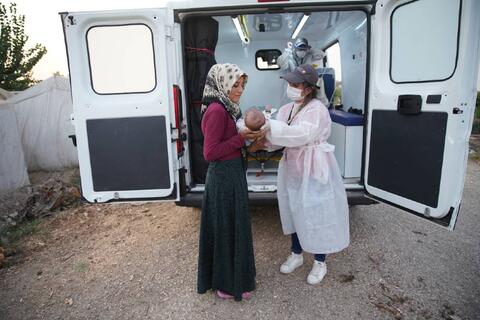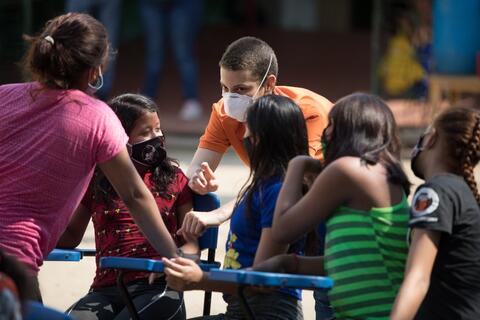News
As global cases of COVID-19 hit grim milestones and exacerbate other crises, UNFPA strengthens resolve to save lives
- 03 February 2021
News
UNITED NATIONS, New York – On January 27, the number of coronavirus cases reached a staggering 100 million worldwide. Earlier, on January 15, deaths attributed to the virus numbered two million. Those aren’t the only figures heading in the wrong direction: The pandemic is endangering the health and well-being of women and girls with spiking cases of gender-based violence and female genital mutilation and deteriorating maternal care and reproductive health services.
But as these crises grow, so too does our resolve. In December, UNFPA Goodwill Ambassador Ashley Judd said, “What UNFPA has taught me is that we can pretend to care but we cannot pretend to show up. UNFPA shows up for girls and women.” Here are 5 ways the United Nations sexual and reproductive health agency, which operates in more than 150 countries, is showing up for – and saving the lives of – women and girls.
1. Crisis: A rise in maternal and child deaths. As COVID-19 strains health-care systems to near breaking point, pregnant women, women suffering complications from childbirth and newborns are increasingly vulnerable, with some scientists projecting dramatic increases in both maternal and child deaths.
How UNFPA shows up: Midwives in India, Zambia, Bangladesh, Somalia and elsewhere are helping pick up the slack, risking their lives to help bring forth new ones. El Salvador and Tajikistan introduced telehealth for pregnant and post-partum women. Somalia established a quarantine area with emergency obstetric and neonatal care services for pregnant and breastfeeding women who tested positive for coronavirus. Yemen has delivered care via mobile clinics – as did Mozambique and Haiti, transformed facilities into maternity wards and resumed reproductive services that had shut down.

2. Crisis: An escalation in gender-based violence. With universal lockdowns and restricted movement, women are trapped at home with their abusers. A UNFPA study from April projected that 31 million additional cases of gender-based violence could occur in six months of lockdown, with 15 million more cases every three months the lockdown continues.
How UNFPA shows up: Helplines in Eastern Europe and Central Asia, Myanmar and Sudan provide critical information like women’s shelter and legal aid and psychosocial support for survivors. Bhutan opened emergency shelters. Egypt inaugurated a new medical response clinic for women subjected to violence. Across Asia and the Pacific, responders are working to treat and end this shadow pandemic.
3. Crisis: Disrupted access to family planning services, which can lead to unintended pregnancies and unsafe abortions. In August, a World Health Organization (WHO) survey found that family planning is one of the health services most frequently disrupted due to the pandemic.
How UNFPA shows up: Despite disruptions in supply chains, shuttered family planning centres and limited in-person appointments, UNFPA is finding ways to provide access to modern contraception. Uganda is delivering supplies via ride-hailing app. Quarantine centres in Nepal are pulling double-duty as family planning spaces. Egypt is making outreach calls. And mentorship sessions in Malawi are equipping girls with knowledge and skills to avoid teenage pregnancy.
4. Crisis: More girls are at risk of female genital mutilation, as a result of curtailment of education, empowerment and anti-FGM programmes. UNFPA estimates these disruptions could lead to 2 million more cases of FGM over the next decade that would otherwise have been averted. This harmful practice – internationally recognized as a human rights violation – can cause infection, haemorrhage and death.

How UNFPA shows up: Somalia, which has one of the highest prevalence rates in the world, is raising awareness and administering emergency medical care to survivors. In Kenya, survivors-turned-champions are sharing their experiences to change attitudes toward ending the practice.
5. Crisis: A shortage of personal protective equipment (PPE). Though the manufacture and distribution of PPE have dramatically improved since the onset of the pandemic, global PPE shortages continue to affect health worker safety and sustainability of health services, according to WHO.
How UNFPA shows up: In 2020, UNFPA procured PPE worth $34 million for front line health workers in 108 countries. Among the many places UNFPA has provided life-saving N95 and surgical masks, gowns, caps, gloves, face shields, eye protectors, shoe covers and hand sanitizer: Viet Nam, Peru, Tanzania, Kurdistan and Paraguay.
Wherever the safety and security of women and girls are threatened, UNFPA will be there.